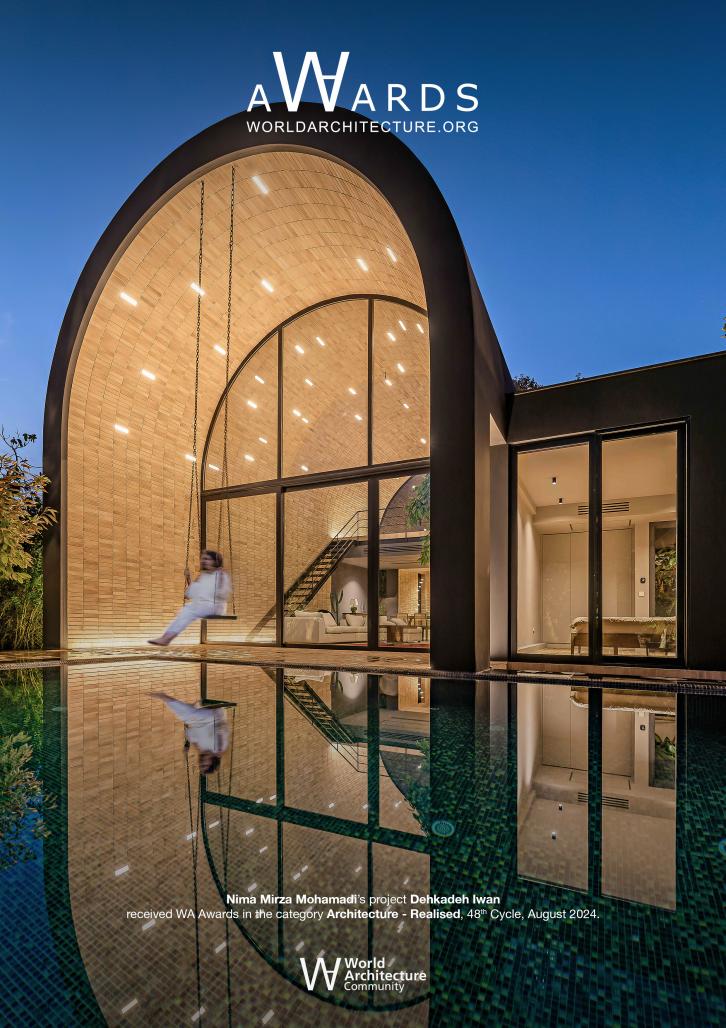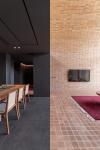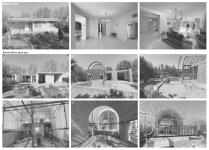An IWAN is a sitting place that is higher than its surroundings, which is usually built in the outer part of a building. The IWAN has been used in Iranian architecture since the Parthian period and Parthian style. An IWAN usually consists of a single arch, enclosed on three sides, and open to the nave. The most famous example of an IWAN in Iran's past architecture is Taq Kasra.
This project is an exercise and experience that serves as a connection to a period of Iran's glorious history! What we call | The architectural wealth of the past |.
It's an attempt to connect one of the most prominent architectural archetypes of the past, the IWAN, to a dilapidated villa, which itself belongs to the period of the introduction of modernism before the Islamic revolution; 50 years have passed since the construction of this villa, and although it has no special architectural value except for its simplicity, it is located in a genuine urban context, a DEHKADEH village.
In order to be able to provide an interpretation of our era in the continuous flow of Iranian architecture, we have tried to move in the boundary between historical references, and belonging to the post-modern era.
The archetype of | IWAN | regardless of its charismatic and impressive form, has created a unique space for the prevailing climate of this land, which is unparalleled in the delectation of space.
Our first visit to this old one-storey building reminded us of an extremely depressing shelter, with a roof that was so short that even the pleasant trees in the yard could hardly be seen, in combination with the thick walls and small windows. This made us fully committed to try to use the architectural patterns of the past to revive that space for a weekend villa belonging to the present era.
The roof of the entire building could not be raised, but if we could raise the living room facing the courtyard, it would be a great gain. Because in this small building, it was the living room that made the heart of the space and into a place for events.
Firstly, after checking the position of the walls, we removed the roof of a section of the hall, and because the new roof had to sit on the side walls, the | Arch | was the most appropriate answer. It was here that the idea of reviving the | IWAN | crossed our minds. Therefore we built a big arch with a span of 7 meters. The arch that extends from the south side and our | IWAN | and faces the main courtyard, creating a new sitting room on the roof level from the north side. Now, the old enclosed building has wide connections and openings, with both the surrounding environment and with the roof.
After the development of the large arch towards the courtyard and the appearance of the main IWAN, we decided to build a similar alternative in the heart of the courtyard and establish a strong connection with the surrounding nature with the path we created between these two arches.
It is here that the IWAN, which has always been open from one side to the outside, opens on both sides and stands on the border between the modern pergola and the old kooshk.
Between that big arch, | IWAN |, and the small arch, | KOOSHK |, we also put a pool that is attached to their conjunction that spreads its freshness and cool between them.
With this approach, a dialectical relationship between the inside and outside of the building has emerged; the building is now surrounded by tall trees and greenery, and with its new architecture, enables for the user a constant enjoyment of nature.
The walls that were located on the north-south axis could not be removed, but we removed or moved the rest of the walls in such a way as to both increase the quality of the interior space and to remove the protrusions from the exterior form of the building, and convert it to a simple cube combined with a large arch.
Another thing we considered was to somehow add a | game | element to the space. The | swing | is one of the most ancient and ritualistic games of the people of IRAN. An uplifting game that has been mentioned in the poetry of many Persian poets to date.
A swing is a rope that is tied to a tree or another place on both sides, on which one can sit and move forward and backward in the air.
Here these ropes are hanging from the top of the IWAN and placed on the border between the IWAN and the pool. Swinging in this IWAN is a unique experience of oscillation, suspension, and and leap between the border of the IWAN and the pool, which playfully mixes these borders.
The presence of bricks and dealing with the details and symbols of past architecture is such that it is not an exact recreation of the past, but it shows off its original roots.
The gray cement of the facade, in addition to reminding of belonging to the present time, seems to protect the brick gem inside. An inside in which bricks cover most of the floor, ceiling and walls, to increase the warmth of the space and strengthen the connection with the past.
2022
2023
The presence of bricks and dealing with the details and symbols of past architecture is such that it is not an exact recreation of the past, but it shows off its original roots.
The gray cement of the facade, in addition to reminding of belonging to the present time, seems to protect the brick gem inside. An inside in which bricks cover most of the floor, ceiling and walls, to increase the warmth of the space and strengthen the connection with the past.
Architect: NIMA MIRZAMOHAMMADI
Design team: Rana Siaghi , Shamim Parvaneh
Executive manager: NIMA MIRZAMOHAMMADI
Site supervision: Reza Sahavan
Dehkadeh Iwan by NIMA MIRZA MOHAMADI in Iran won the WA Award Cycle 48. Please find below the WA Award poster for this project.

Downloaded 0 times.
Favorited 10 times






















